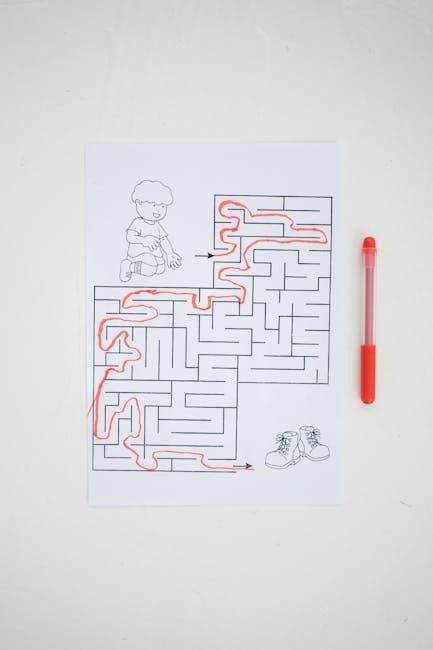Ikigai is a Japanese concept emphasizing finding purpose and fulfillment in life. It combines passion, skill, and societal impact, guiding individuals toward meaningful existence and longevity.
Definition and Origin of Ikigai
Ikigai, a Japanese concept, translates to “reason for being” or “life’s purpose.” Originating from Japanese philosophy, it represents the intersection of passion, mission, vocation, and profession. Rooted in Japanese culture, Ikigai is believed to bring fulfillment and longevity. It encourages individuals to find meaning by aligning their skills, values, and societal contributions. The term has gained global recognition as a tool for personal growth and life satisfaction, emphasizing balance and purpose in daily life. Its origins reflect Japan’s holistic approach to living, where purpose and happiness are deeply intertwined with work and existence.
The Concept of Ikigai in Modern Context
In today’s fast-paced world, Ikigai has evolved into a modern philosophy for achieving work-life balance and personal fulfillment. It encourages individuals to align their passions with societal needs, fostering purpose and satisfaction. The rise of remote work and digital tools has made Ikigai more relevant, as people seek meaningful roles beyond traditional employment. By integrating mindfulness and self-reflection, Ikigai helps individuals navigate modern challenges, emphasizing the importance of living a life that feels purposeful and impactful. This timeless concept continues to inspire global audiences, offering a framework for thriving in an ever-changing world.

Key Concepts of Ikigai
Ikigai is a Japanese philosophy centered on finding life’s purpose by balancing passion, mission, vocation, and profession. It emphasizes harmony and fulfillment, guiding individuals to their ideal life path.
The Four Elements of Ikigai
Ikigai is built on four core elements: passion, mission, vocation, and profession. Passion refers to what you love doing, while mission is your purpose in life. Vocation involves using your skills to benefit others, and profession is how you earn a living. Balancing these elements helps individuals discover their Ikigai, creating a fulfilling and purposeful life. The Ikigai worksheet guides users to explore these elements, aligning personal values with societal contributions. By identifying and harmonizing these aspects, individuals can uncover their reason for being and achieve long-term satisfaction and well-being.
Ikigai and Life Satisfaction
Ikigai significantly contributes to life satisfaction by providing a sense of purpose and fulfillment. When individuals align their passions, skills, and societal contributions, they experience heightened joy and contentment. The Ikigai worksheet helps users identify these elements, fostering a balanced and meaningful life. Research indicates that practicing Ikigai leads to increased life satisfaction, as it bridges personal aspirations with societal impact. This alignment not only enhances emotional well-being but also encourages individuals to pursue activities that bring them happiness and a sense of accomplishment, ultimately enriching their overall quality of life and fostering a deeper connection to their purpose.
Ikigai as a Balance Between Work and Life
Ikigai serves as a bridge between professional and personal life, helping individuals achieve harmony. It emphasizes finding purpose in both work and personal activities, ensuring a balanced and fulfilling existence. The Ikigai worksheet guides users to align their passions, skills, and societal contributions, creating a seamless integration of work and life. This balance reduces stress and enhances overall well-being, allowing individuals to thrive in all aspects of life. By fostering this equilibrium, Ikigai promotes a holistic approach to living, where work and personal life complement each other, leading to greater satisfaction and a sense of purpose.

Benefits of Discovering Your Ikigai
Discovering your Ikigai enhances mental well-being, improves physical health, and promotes longevity by aligning passion, skill, and purpose, leading to a fulfilling and balanced life.
Ikigai and Mental Well-Being
Ikigai, a Japanese concept, profoundly impacts mental well-being by fostering a sense of purpose and fulfillment. When individuals align their passions with skills and societal needs, they experience reduced stress and anxiety. The clarity and direction provided by Ikigai help combat feelings of emptiness, promoting emotional balance. Studies suggest that practicing Ikigai can lower mortality rates, highlighting its role in mental health. By cultivating meaning and joy, Ikigai empowers individuals to embrace life fully, leading to a more resilient and positive mindset. This alignment of purpose and passion creates a foundation for lasting mental well-being and overall life satisfaction.
Ikigai and Physical Health
Ikigai, a Japanese philosophy, significantly influences physical health by providing a sense of purpose and motivation. Studies indicate that individuals who embrace their Ikigai tend to have lower mortality rates and improved physical well-being. The alignment of passion, skill, and societal contribution fosters a positive lifestyle, reducing stress and promoting longevity. By engaging in meaningful activities, people are more likely to adopt healthy habits, enhancing their overall health. Ikigai’s emphasis on purposeful living encourages regular exercise, balanced nutrition, and mental relaxation, all of which contribute to a healthier and more vibrant life. This holistic approach underscores the connection between purpose and physical health.
Ikigai and Longevity
Ikigai, a Japanese concept, has been linked to longevity through its emphasis on purposeful living. A seven-year study involving over 40,000 participants revealed that individuals who embraced their Ikigai experienced a 15% lower mortality rate. This philosophy fosters a sense of fulfillment, reducing stress and promoting healthy habits. By aligning passion, skill, and societal contribution, Ikigai encourages a balanced lifestyle that supports physical and mental well-being. The pursuit of meaningful goals inherent in Ikigai contributes to a longer, healthier life, as it motivates individuals to maintain purpose and engagement, key factors in extending lifespan and enhancing quality of life.

How to Find Your Ikigai
Discovering Ikigai involves self-reflection, identifying passions, and aligning skills with values. It requires exploring purpose and societal contribution, guided by tools like the Ikigai worksheet.
Self-Reflection and Self-Assessment
Self-reflection and self-assessment are crucial steps in discovering your Ikigai. They involve introspectively examining your values, passions, and skills to identify what truly fulfills you. By understanding your strengths and weaknesses, you can align your actions with your purpose. The Ikigai worksheet often includes exercises that prompt users to list their hobbies, talents, and what the world needs, helping narrow down their Ikigai. This process encourages mindfulness and clarity, enabling individuals to move closer to a life of meaning and satisfaction. Regular self-assessment ensures continuous growth and alignment with one’s evolving purpose.
Exploring Passions and Skills
Exploring passions and skills is a foundational step in identifying your Ikigai. The Ikigai worksheet guides users to list their hobbies, talents, and areas of expertise, helping them recognize what they enjoy and excel at. By aligning these elements with societal needs and potential rewards, individuals can uncover their purpose. This process encourages self-awareness and helps bridge the gap between personal interests and professional capabilities. Regularly revisiting and refining this exploration ensures growth and alignment with evolving passions and skills, ultimately contributing to a fulfilling and purpose-driven life.
Aligning Values with Purpose
Aligning values with purpose is a critical step in the Ikigai journey, ensuring that your actions resonate with your beliefs and ethics. The Ikigai worksheet helps identify core values and assess how they intersect with your passions and skills; By reflecting on what truly matters, individuals can create a purpose-driven life that feels authentic and meaningful. This alignment fosters a sense of integrity, as your efforts contribute to goals that resonate deeply with your personal principles. Regularly revisiting and refining this alignment ensures continued harmony between your values and purpose, leading to a more fulfilling and impactful existence.

Ikigai Worksheet: A Practical Guide
The Ikigai Worksheet is a tool to discover purpose by exploring passions, skills, and values, guiding individuals toward a fulfilling life aligned with their true potential.
Structure and Components of the Ikigai Worksheet
The Ikigai Worksheet is structured to help individuals identify their purpose by exploring four key elements: passion, skill, value to society, and potential income. It often includes sections for self-reflection, such as listing activities that bring joy, skills one excels in, and ways to contribute meaningfully. The worksheet may also feature a Venn diagram to visualize the intersection of these elements, guiding users toward their Ikigai. Additional components might include goal-setting sections and prompts for aligning personal values with life purpose, making it a comprehensive tool for self-discovery and fulfillment.
How to Use the Ikigai Worksheet Effectively
To use the Ikigai Worksheet effectively, start by approaching it with a clear and open mind. Begin by reflecting on your passions, skills, and values, ensuring honesty in your responses. Complete each section systematically, exploring activities that bring joy and those where you excel. Use the Venn diagram to identify overlaps, which may reveal your Ikigai. Set actionable goals based on your findings and revisit the worksheet regularly to track progress. Patience and persistence are key, as discovering your Ikigai is a journey. By leveraging the worksheet thoughtfully, you can align your purpose with meaningful contributions and lasting fulfillment.
Examples of Ikigai Worksheet Exercises
Ikigai Worksheets often include exercises like listing your passions, skills, and values, then identifying overlaps. One exercise involves creating a Venn diagram with four circles representing what you love, what you’re good at, what the world needs, and what you can be paid for. Another exercise asks you to reflect on moments when time seemed to fly, indicating alignment with your Ikigai. Additionally, goal-setting exercises help translate insights into actionable steps. These practical tasks guide users to uncover their purpose and align it with meaningful contributions, fostering a sense of fulfillment and direction in life.

Ikigai in Different Cultures and Societies
Ikigai, a Japanese concept, emphasizes purpose and fulfillment. While deeply rooted in Japanese culture, its universal appeal has led to adaptation in Western societies, fostering global relevance and application.
Ikigai in Japanese Culture
Ikigai is deeply rooted in Japanese philosophy, emphasizing purpose and fulfillment. It reflects the cultural values of harmony, balance, and contribution to society. In Japan, Ikigai is often associated with longevity and life satisfaction, as studies show individuals practicing Ikigai tend to live longer. The concept encourages individuals to find meaning in daily activities, whether through work, hobbies, or personal passions. It is not just a personal pursuit but also a societal ideal, fostering a sense of community and shared purpose. Ikigai in Japanese culture is a holistic approach to life, blending personal happiness with societal contribution, creating a meaningful existence.
Ikigai in Western Societies
Ikigai has gained popularity in Western societies as a philosophy for living a purposeful life. It resonates with the growing desire for work-life balance and meaningful existence. Westerners often adapt Ikigai by focusing on aligning personal passions with societal contributions. The concept is frequently explored in self-help literature and personal development circles, encouraging individuals to find fulfillment in their careers and hobbies. Unlike its deep cultural roots in Japan, Ikigai in the West is often seen as a tool for personal growth and happiness. It reflects a shift toward valuing purpose and satisfaction in both professional and personal realms of life.
Universal Relevance of Ikigai
Ikigai transcends cultural boundaries, offering a universal framework for finding purpose and fulfillment. Its principles—passion, skill, societal impact, and financial reward—resonate globally, encouraging individuals to align their lives with meaningful goals. Whether in Japan or the West, Ikigai’s emphasis on balance and contribution fosters a sense of direction and satisfaction. It bridges personal aspirations with societal needs, making it a timeless philosophy for people of all backgrounds. The concept’s adaptability ensures its relevance in diverse contexts, helping individuals worldwide navigate life’s challenges and pursue a purposeful existence. Its universal appeal lies in its ability to inspire and guide anyone seeking fulfillment.

Ikigai and Personal Growth
Ikigai fosters personal growth by guiding individuals to self-discovery, purpose, and fulfillment. It encourages aligning passions with societal impact, promoting a meaningful and evolving life journey.

Ikigai as a Tool for Self-Discovery
Ikigai serves as a powerful tool for self-discovery, helping individuals uncover their purpose and passion. Through structured reflection, the Ikigai worksheet guides users to explore their values, skills, and societal impact. By identifying what they love, what they’re good at, and what the world needs, individuals can align their life’s work with their true potential. This process fosters a deeper understanding of oneself, enabling meaningful personal growth and a sense of fulfillment. The worksheet’s exercises encourage introspection, making it an invaluable resource for those seeking clarity and direction in their lives.
Ikigai and Goal Setting
Ikigai plays a significant role in goal setting by aligning personal aspirations with purpose and meaning. The Ikigai worksheet helps individuals identify and prioritize goals that resonate with their values, passions, and skills. By focusing on what truly matters, users can set realistic and fulfilling objectives. The worksheet encourages breaking down long-term goals into actionable steps, ensuring progress toward a meaningful life. Ikigai-inspired goal setting emphasizes balance, ensuring that personal and professional ambitions align with societal contribution. This approach fosters a sense of direction and purpose, enabling individuals to pursue their goals with clarity and determination, leading to a more fulfilling existence.
Ikigai and Mindfulness Practices
Ikigai and mindfulness practices share a deep connection, as both emphasize living in the present with purpose. The Ikigai worksheet encourages users to reflect on their values, passions, and skills, fostering a mindful approach to life. By aligning actions with one’s purpose, individuals cultivate a sense of fulfillment and balance. Mindfulness practices, such as meditation and self-awareness, complement the Ikigai journey by helping individuals stay grounded and focused on their goals. This integration promotes mental clarity, emotional well-being, and a deeper understanding of life’s meaning, ultimately contributing to a more mindful and purpose-driven existence.
Ikigai in the Digital Age

Ikigai adapts to the digital world, blending traditional purpose-seeking with modern tools like AI and automation, helping individuals find meaning amidst technological advancements and remote work trends.
Ikigai and Technology
Technology influences Ikigai by reshaping how individuals discover purpose and meaning. AI and automation redefine work, pushing people to align their passions with technological advancements. While these tools streamline tasks, they also challenge traditional notions of purpose. Embracing technology mindfully allows individuals to balance productivity with fulfillment, ensuring Ikigai remains relevant in a rapidly changing world. By integrating tech into self-reflection, such as through digital Ikigai worksheets, people can explore their values and skills more efficiently, fostering a harmonious blend of innovation and personal growth.
Ikigai in the Context of AI and Automation
AI and automation are reshaping industries, challenging traditional notions of purpose and work. As machines assume routine tasks, individuals must redefine their Ikigai, focusing on skills that require human creativity and empathy. While AI may disrupt jobs, it also creates opportunities for meaningful work aligned with personal passions and societal needs. The Ikigai worksheet can help individuals navigate this shift, encouraging reflection on values and skills that remain relevant in an automated world. By embracing change and leveraging technology, people can find new purpose, ensuring their Ikigai evolves alongside technological advancements.
Ikigai and Remote Work
Remote work has redefined how individuals align their Ikigai with professional and personal life. The flexibility of remote work allows people to focus on tasks that bring fulfillment and purpose, aligning with their Ikigai. With reduced commuting time, individuals can invest more in activities that nurture their passions and skills. The Ikigai worksheet can serve as a tool to reflect on how remote work environments support or hinder one’s pursuit of purpose. By identifying roles that harmonize with personal values and societal contributions, remote workers can achieve a balanced and meaningful life, embodying the essence of Ikigai in the digital age.
Ikigai worksheets guide individuals to discover their purpose, fostering fulfillment and balance. This tool empowers personal growth, aligning passions with societal contributions for a meaningful life.
The Lasting Impact of Ikigai
Ikigai profoundly influences life satisfaction and longevity, as studies show individuals practicing Ikigai experience lower mortality rates. The Ikigai worksheet serves as a practical tool for self-discovery, helping users align their values with purpose. By fostering mental well-being and resilience, Ikigai cultivates a balanced, fulfilling life. Its universal relevance transcends cultures, offering a timeless framework for personal growth and societal contribution. Embracing Ikigai not only enhances individual lives but also promotes a more purpose-driven, compassionate world. Its enduring impact lies in its ability to guide people toward meaningful existence, making it a cherished concept in modern and traditional contexts alike.

Final Thoughts on Ikigai and Its Relevance
Ikigai offers a timeless framework for discovering purpose and fulfillment, transcending cultural boundaries. Its relevance in modern life is undeniable, as it encourages balance, resilience, and meaningful contribution. The Ikigai worksheet serves as a powerful tool for self-discovery, guiding individuals to align their passions with societal impact. By embracing Ikigai, people can cultivate mental well-being, physical health, and a sense of longevity. Its universal appeal lies in its ability to adapt to evolving contexts, such as remote work and technological advancements. Ultimately, Ikigai reminds us that life’s true richness lies in pursuing a purpose that brings joy, fulfillment, and lasting satisfaction.